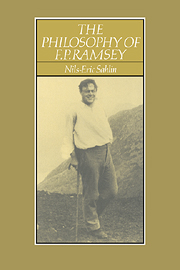Book contents
- Frontmatter
- Contents
- Preface
- Acknowledgements
- INTRODUCTION
- Chapter 1 PHILOSOPHY OF PROBABILITY
- Chapter 2 BELIEF AND TRUTH
- Chapter 3 KNOWLEDGE
- Chapter 4 GENERAL PROPOSITIONS AND CAUSALITY
- Chapter 5 PHILOSOPHY OF SCIENCE
- Chapter 6 LOGIC AND MATHEMATICS
- Chapter 7 RAMSEY'S THEOREM
- Chapter 8 UNIVERSALS
- Chapter 9 ECONOMICS
- Chapter 10 BIOGRAPHICAL GLIMPSES
- Notes
- Bibliography of F. P. Ramsey's works
- Index of names
Chapter 3 - KNOWLEDGE
Published online by Cambridge University Press: 18 September 2009
- Frontmatter
- Contents
- Preface
- Acknowledgements
- INTRODUCTION
- Chapter 1 PHILOSOPHY OF PROBABILITY
- Chapter 2 BELIEF AND TRUTH
- Chapter 3 KNOWLEDGE
- Chapter 4 GENERAL PROPOSITIONS AND CAUSALITY
- Chapter 5 PHILOSOPHY OF SCIENCE
- Chapter 6 LOGIC AND MATHEMATICS
- Chapter 7 RAMSEY'S THEOREM
- Chapter 8 UNIVERSALS
- Chapter 9 ECONOMICS
- Chapter 10 BIOGRAPHICAL GLIMPSES
- Notes
- Bibliography of F. P. Ramsey's works
- Index of names
Summary
What does it mean to say that we know something? Do we know anything at all? What is there to say that we are not brains floating in a glass tank in a laboratory? Flapping our ears – which have been left to us – we sail along in the glass tank. With our eyes which we have also been allowed to retain, we peer through the glass sides of the tank. The tank is placed in an even bigger tank on the inside of which is a screen. Onto this screen the laboratory staff project our reality. Smells and other sense perceptions are produced by electrodes inserted into our brains. At the same time as new slides are projected onto the white screen, a computer activates the electrodes in predetermined sequences. Would there be any noticeable difference between our actual life and life in such a tank? If the experiment were properly conducted, the brain would become just as hungry as we do and just as exhausted; it would fall in love now and again with one or other of the people projected on the screen; and so on. How then can we know that our life is not lived in such a tank? It is difficult to answer this sceptical question in a totally satisfactory way. Just as we have difficulty in convincing the solipsist of our existence, we have difficulty in convincing the sceptic that knowledge about a factual world is possible.
- Type
- Chapter
- Information
- The Philosophy of F. P. Ramsey , pp. 81 - 101Publisher: Cambridge University PressPrint publication year: 1990



